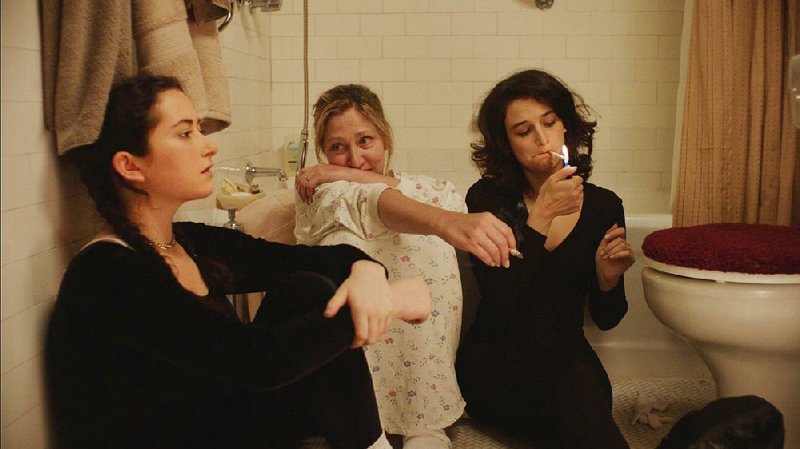Landline, Gillian Robespierre's follow-up to her near-hit debut Obvious Child, is a period piece, set firmly in 1995, before ubiquitous cellphones and internet access. Again working with co-writer Elisabeth Holm and comedian Jenny Slate -- this time in an ensemble rather than star-making context -- Robespierre has produced a milder, more episodic movie that retains Obvious Child's commitment to the way real people talk and behave while lacking its dramatic and emotional thrust.
It's a nice enough romantic comedy that's as interested in appearing as nonjudgmental and matter-of-fact about sex as your feminist aunt, but it seems unlikely to dent the zeitgeist the way Obvious Child did.
Landline
83 Cast: Jenny Slate, John Turturro, Edie Falco, Abby Quinn, Jay Duplass, Finn Wittrock, Jordan Carlos, Ali Ahn, India Menuez, Charlotte Ubben, Marquis Rodriguez
Director: Gillian Robespierre
Rating: R, for sexual content, language and drug use
Running time: 1 hour, 37 minutes
It primarily concerns three women, female members of a fraying upper-middle-class Italian-Jewish New York brood called the Jacobs -- described by one character as "a family of cheaters" -- who might fancy themselves somewhat akin to J.D. Salinger's Glass clan.
Mother Pat (Edie Falco) is a high-powered environmental lawyer who takes her fashion cues from first lady Hillary Clinton; she is married to Alan (John Turturro), a bearded advertising executive and aspiring (i.e., failed) playwright. Older daughter Dana (Slate) has a job working as a layout artist for Paper magazine. She's living with her fiance, Ben (Jay Duplass), who we peg as a generic nice guy from the film's opening seconds, when he's having uninteresting and apparently uncomfortable sex with Dana al fresco.
Ali (Abby Quinn) is a high schooler who is beginning to dabble in harder drugs than marijuana and who solidifies her liberal cred by sleeping with her biracial boyfriend Jed (Marquis Rodriguez). (The only reason Jed exists is so his race might pass unmentioned, in order to demonstrate how Ali's standoffishness with her parents is partially explained by her recent discovery that her father is not only having an affair, but that he's been writing erotic poetry for his lover. Poetry she duly prints out on the family's dot-matrix printer.)
Meanwhile Dana, understandably bored with Ben, moves back into the family apartment after running into an old college chum (Finn Wittrock) with whom she embarks on an affair that includes a movie balcony tryst during a screening of a documentary about Nazi atrocities. (Take that, Woody Allen.)
All these characters behave in more or less explicable ways, and Turturro and Falco in particular manage to fill out their characters with little eye flicks and knowing nods, lending a rather thin script some ballast it wouldn't otherwise achieve. Even Ben turns out to be somewhat more substantial than he first appears.
But it's not surprising that the meat of the film turns out to be the sisterly relationship between Dana and Ali, which plays out as a collaboration between two incompatible humans who just happen to share DNA. They find common ground as they investigate their father's infidelity, but their best scenes together are the awkward ones. Slate and Quinn are willing to come across as unsympathetic.
Yet in the end these fine performances are betrayed by a script that stubbornly resists addressing the more interesting questions raised by the situations it imposes on its characters. Some will probably find it refreshing that the men in this world seem divided into superficial hunks and neurotic nerds -- maybe that's just Robespierre's feminine gaze having fun with the old Madonna/Whore complex -- but the reductiveness precludes a more interesting take on the male characters.
Setting the film in the '90s allows for some interesting textures and details. Without cellphones and social media, characters have to face one another to convey inconvenient information. But the film doesn't make as much of this as it might. Instead it dutifully replicates the pre-digital world of mix tapes and CD listening stations and record stores, a tactic bound to inspire soothing nostalgia, especially when coupled with an eclectic soundtrack that includes Steve Winwood, timecode-specific hip-hop and African dance music.
It's a misfire, but not a disaster. If you can forgive Landline's tendency to strain for adorability, you might enjoy its more naturalistic moments.
MovieStyle on 08/04/2017


